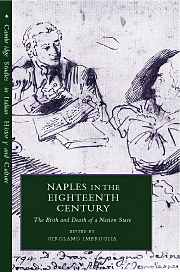Book contents
- Frontmatter
- Contents
- List of abbreviations
- Introduction
- 1 The capital and the provinces
- 2 The Court: power relations and forms of social life
- 3 The arrogance of the market: the economy of the Kingdom between the Mediterranean and Europe
- 4 Enlightenment in eighteenth-century Naples
- 5 The feudal question, judicial systems and the Enlightenment
- 6 Intellectuals and academies
- 7 Music and Enlightenment
- 8 Antiquarian studies in Naples at the end of the eighteenth century. From comparative archaeology to comparative religion
- 9 How not to finish a revolution
- Bibliography
- Index of names
- CAMBRIDGE STUDIES IN ITALIAN HISTORY AND CULTURE
4 - Enlightenment in eighteenth-century Naples
Published online by Cambridge University Press: 14 October 2009
- Frontmatter
- Contents
- List of abbreviations
- Introduction
- 1 The capital and the provinces
- 2 The Court: power relations and forms of social life
- 3 The arrogance of the market: the economy of the Kingdom between the Mediterranean and Europe
- 4 Enlightenment in eighteenth-century Naples
- 5 The feudal question, judicial systems and the Enlightenment
- 6 Intellectuals and academies
- 7 Music and Enlightenment
- 8 Antiquarian studies in Naples at the end of the eighteenth century. From comparative archaeology to comparative religion
- 9 How not to finish a revolution
- Bibliography
- Index of names
- CAMBRIDGE STUDIES IN ITALIAN HISTORY AND CULTURE
Summary
What was the Enlightenment? Historians have drawn a picture in which the times and rhythms of its various instances are different, as are its ideals and objectives. Yet common characteristics can be identified, from Edinburgh to Milan or Paris. When Cesare Becarria and Alessandro Verri arrived in Paris, they felt at home in the salons of d'Holbach and Helvétius, just as David Hume felt at home at the same period in the same salons. What these intellectuals had in common was their intellectual identity as philosophes, whether from Scotland or Italy. If we wish to study the development of the Enlightenment, however, the model case remains that of France.
In 1750–1 the French government, led by Machault, aware of the crisis the state was going through, contrived a reform programme of which the main lines remained central for all subsequent governments. In 1751 the first volume of the Encyclopédie was published. Diderot and d'Alembert planned and realised this gigantic work in order to radically transform the mental, social and political structures of France. Here were two different and independent approaches to solving the crisis of the French state. Enlightenment and politics found themselves in a relationship of simultaneous independence and mutual support in a long article by Diderot entitled ‘Autorité politique’, in which he idealised the group of wise men who, aware of their role, their nature and their differences, surrounded and advised the good king Henry IV.
- Type
- Chapter
- Information
- Naples in the Eighteenth CenturyThe Birth and Death of a Nation State, pp. 70 - 94Publisher: Cambridge University PressPrint publication year: 2000
- 2
- Cited by



